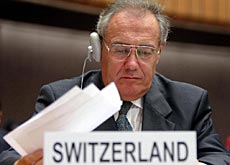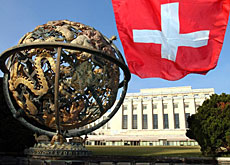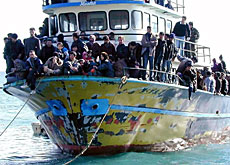Swiss diplomat appointed to oversee UNHCR

The United Nations refugee agency, or UNHCR, has chosen a Swiss diplomat to steer the organisation through a challenging period in its history.
swissinfo spoke to Jean-Marc Boulgaris, the new chairman of the agency’s executive committee, about some of the difficult tasks that lie ahead over the next 12 months.
The UNHCR has been providing aid for refugees around the world for more than 50 years.
But it is now having to redefine its role in the face of ever-increasing violence against staff in areas such as Iran and Afghanistan.
The executive committee’s mandate includes setting the budget and advising the high commissioner, Ruud Lubbers, on policy.
swissinfo: Do you think your appointment is a sign that Switzerland is being taken more seriously by the UN now that it is a full member?
J.-M.B.: I must point out that we have been a member of the UNHCR for many years. In that respect Switzerland’s standing within the high commissioner’s office is certainly not due to the fact that we are a member of the UN, but because we have been working for more than 50 years on refugee issues with our colleagues in the international community.
swissinfo: Switzerland has a long and generous tradition of accepting refugees from all over the world. Do you think it can bring special experience and expertise to the UNHCR?
J.-M.B.: Yes, certainly. As I said we have been very active as far as the treatment of refugees is concerned – even before the creation of the UNHCR. I am myself the son of a refugee family, which came to Switzerland in the 19th century. We can bring this experience to the discussions we have within the UNHCR.
swissinfo: What do you see as the main challenges facing the executive committee of the UNHCR at the moment?
J.-M.B.: Certainly to see that the organisation works as efficiently as possible, to make sure that the money at our disposal is well used, and, of course, to convince donors to be generous, because the UNHCR works only on the basis of voluntary funding from participating states.
swissinfo: We hear about funding crises from nearly every UN aid agency. Is this also a major problem for the UNHCR?
J.-M.B.: Yes, it is, because we are in a phase where governments have to save money wherever they can, and this affects international organisations as a whole. With the UNHCR, we had a very hard time last year because we had to cut programmes. Refugees suffered because we could not provide the necessary financial means to help them.
This year, the situation looks a bit more favourable, but we have to be conscious that this commitment from the international community towards refugees has to be sustained.
swissinfo: We hear more and more about the difficult security situation for humanitarian workers in many parts of the world. What can be done about that?
J.-M.B.: There are people who don’t understand why these workers are there; we have to stress that they are there to help and nothing else. Secondly, we have to make the authorities responsible for law and order in these places more aware of the fact that they have an important task to fulfil by protecting these humanitarian workers.
And thirdly, we have to think about the deployment of staff, because, as you saw in Iraq, the United Nations had to withdraw a large part of its staff.
swissinfo: Since the UNHCR came into existence, the type of refugee has changed somewhat. There are internally displaced people, economic migrants who claim asylum. Should the definition of a refugee be changed?
J.-M.B.: I don’t think there is any need to change the definition of refugees, which dates from the First World War. But there has been a big change since the foundation of the UNHCR, which was created to solve the problems of refugees provoked by the Second World War, in Europe mainly.
We have realised that Europe is not alone in being affected by this terrible refugee drama, and we recognise that this problem is here to stay.
There is some confusion between refugees and migrants, but the difference must be maintained. On the Swiss side, we have launched the Berne Initiative to see how we can address this issue of distinguishing between migrants and refugees.
swissinfo-interview: Imogen Foulkes
Jean-Marc Boulgaris is Switzerland’s permanent representative to the United Nations in Geneva.
Switzerland was a founding member of the UNHCR, but has only been a full member of the United Nations since September 2002.
The UNHCR has has three Swiss high commissioners: August Lindt (1956-60), Felix Schnyder (1960-65) and Jean-Pierre Hocké (1986-89).
The UNHCR was established on December 14, 1950.
The agency is mandated to lead and co-ordinate international action to protect refugees and resolve refugee problems worldwide.
Its primary purpose is to safeguard the rights and well-being of refugees.
In over 50 year, the agency has helped an estimated 50 million people restart their lives.

In compliance with the JTI standards
More: SWI swissinfo.ch certified by the Journalism Trust Initiative


You can find an overview of ongoing debates with our journalists here . Please join us!
If you want to start a conversation about a topic raised in this article or want to report factual errors, email us at english@swissinfo.ch.